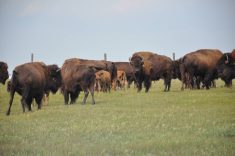An avian flu outbreak at a turkey farm north of Winnipeg may have made headlines last fall, but the quarantine of a Manitoba hatchery had a much larger impact on turkey farmers in Western Canada, said Bill Uruski, Manitoba Turkey Producers chair.
In late November, the Canadian Food Inspection Agency announced that birds at a turkey farm in the Rural Municipality of Rockwood had tested positive for a low pathogenic strain of H5N2 avian flu.
Consequently, CFIA and Manitoba government employees destroyed more than 8,000 turkeys at the infected farm.
Read Also

Trump’s tariffs take their toll on U.S. producers
U.S. farmers say Trump’s tariffs have been devastating for growers in that country.
But the CFIA also quarantined a hatchery near Gunton, Man., because eggs from the infected premise were sold to the hatchery.
“The hatchery had to totally depopulate of 600,000 plus eggs,” said Uruski, noting the Gunton turkey hatchery is the largest in Western Canada.
“The farm had a big impact but the hatchery was even bigger.”
Uruski estimated the 600,000 eggs represent 10 percent of the annual production at the Gunton hatchery. The loss of eggs will have a short-term impact on turkey producers in Western Canada.
“When I say short run, probably for about 60 days,” said Uruski.
“Some of our winter production (in Western Canada) will have to be imported.”
Overall, Uruski said the CFIA handled the avian flu outbreak efficiently. But in this case the CFIA quarantined several turkey farms that had contact with the infected farm and he wonders if that protocol is necessary.
As an example, if a person stopped at a farm after visiting the infected premise, perhaps the birds should’ve been tested before a quarantine was slapped on the new location.
CFIA did not return phone calls for this story.
The agency is expected to provide a report on its H5N2 avian flu investigation in Manitoba before the end of February, Uruski said.
Wayne Lees, Manitoba’s chief veterinarian, told the CBC that one component of the avian flu investigation was a success.
This fall, the province installed a new computer system with a database of farm premises. The software allowed investigators to rapidly identify farms that might have had contact with the infected turkey operation.
“Having this premises identification system was one of the key factors to our being able to respond so quickly.”















